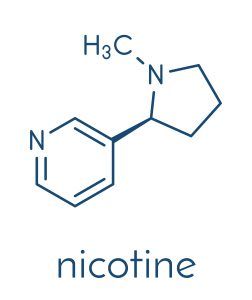Quitting nicotine is not easy, so you should expect to experience withdrawal symptoms. Smoking cessation medications can help to make the process easier. (Learn More)
There are also some common strategies you can use to help you quit smoking. (Learn More)
In order for smoking cessation medications to work properly, you must use them exactly as instructed. (Learn More)
While many of these medications are expensive, there are some available in generic forms that could save you money. (Learn More)
How Smoking Becomes Addictive

Nicotine affects receptors in the brain. It changes brain chemistry as soon as seven seconds after you start smoking. Ultimately, nicotine releases dopamine in the brain, and this is responsible for the pleasurable feeling of reward you get when you smoke cigarettes.
The effect rapidly goes away, and this is why many people smoke often throughout the day.
Quitting smoking cold turkey, or going without a cigarette for longer than usual, is likely to cause symptoms of withdrawal.
What Are Smoking Cessation Medications?
Smoking cessation medications are meant to help you quit smoking. They are not the same as nicotine patches or nicotine replacements, and you cannot purchase them over the counter.
The National Institute on Drug Abuse (NIDA) says that there are three types of proven smoking cessation medications you can use to help you stop smoking for good.
- Chantix: This is a prescription medication, also known by its generic name varenicline. The medication works by stimulating the same receptors in the brain as nicotine, or the nicotinic acetylcholine receptors.
Chantix lasts several hours and promotes a release of dopamine in the brain. This occurs at a lesser degree than with nicotine. The medication stays in the brain for a longer period of time than nicotine.
The medication dampens some of the pleasure experienced from smoking. If someone smokes a cigarette while taking Chantix, they will not feel as satisfied.
But Chantix is not for everyone. The medication has been associated with side effects, and it can be expensive.
- Bupropion: Per Mayo Clinic, bupropion is an antidepressant used to treat seasonal affective disorder (SAD). However, it is also useful in smoking cessation.
Bupropion is known to prevent the brain from reabsorbing norepinephrine and dopamine, two brain chemicals associated with feelings of pleasure.
Mayo Clinic says that you can increase bupropion’s effectiveness if you use it as part of your overall strategy to quit smoking. If you cannot afford name-brand forms of bupropion, there are some generic versions available.
However, in October 2012, Science magazine reported potential issues with the 300 mg formulation of generic forms of bupropion. Generic versions of the medication were not found to be bioequivalent to the name-brand versions of bupropion.
- Nicotine replacement therapy (NRT): NIDA says that NRT is one of the few over-the-counter methods you can use to quit smoking. This option is available as nicotine patches, gums, or lozenges that can especially help those who just quit smoking.
People who have been smoking for longer periods can benefit from using them longer. This method is just as effective as prescription methods for smoking cessation.
Nicotine patches are known to be safe for use for up to 24 weeks. These methods can be combined as necessary in order to improve outcomes and prevent relapse.
Tips to Quit Smoking
In addition to medication and nicotine replacement therapy, you can also help yourself by following tips from reputable sources such as MedlinePlus.
- Do not dwell on past failures. You may have tried to quit smoking in the past and failed. Focus on the experience you gained and use that to try again.
- Learn about withdrawal. It is common to crave nicotine, get headaches, or become moody as you quit smoking. If you learn more about these symptoms, you can prepare yourself for them before they arrive.
- Give yourself a deadline. Choose a date to quit and start then.
- Identify your triggers. Write down the times you know you are more likely to smoke and the situations in which you are more likely to do so. Stress, time spent with other smokers, or social situations could be driving your cravings for nicotine.
- Build a community. Tell your friends, family members, and trusted colleagues that you plan on quitting smoking. They can provide support and will then understand if you become moody. Your community can also hold you accountable.
- Have a strategy. You will need ideas for what to do to fill your time. Work on hobbies that will distract you, such as puzzles, exercise, and social time with friends who do not smoke. Focus on getting through each day.
- Get rid of nicotine products. Throw out your cigarettes and ashtrays. Get rid of things that smell like smoke, or clean clothes, furniture, and other items thoroughly.
There are online forums available for people who want to quit smoking. Mindfulness exercises that train you to relax and therapy can complement lifestyle changes and medications. Approaching the issue from multiple angles often works best.
Frequently Asked Questions
How do smoking cessation medications work?
Chantix interacts with receptors in the brain influenced by nicotine. It attaches itself to them so you can feel satisfied and experience fewer cravings. If you relapse while on the medication, you will not feel the same sense of reward that you did before.
Bupropion ensures that your brain does not get rid of chemical messengers associated with pleasure, such as dopamine and norepinephrine. This allows you to continue to feel satisfied, and it is known to prevent future nicotine cravings. Both bupropion and Chantix are prescription medications.
Nicotine replacement therapy (NRT) involves products containing nicotine that you can use in order to reduce cravings. You may be able to use more than one at a time as appropriate. NRT products are available over the counter.
How do I use a smoking cessation medication?
If you use a prescription medication, you must follow directions from your doctor and the manufacturer. For over-the-counter medication, follow directions on the package, but consult a doctor if you have any questions.
What are some other ways I can quit smoking?
Therapy, mindfulness, and even online forums can help you quit smoking. This may be enough for people with a less severe addiction, but they can also complement your efforts as you use medication.
Are there generic versions of smoking cessation medications?
No generic form of Chantix is available. In addition its generic form, bupropion is also available under various brands. NRT medication is available over the counter under a variety of brand names.
References
How to Get Through Your First Week When You Quit Smoking. (March 2019). Verywell Mind.
Tips on How to Quit Smoking. (September 2018). MedlinePlus.
What Are Treatments for Tobacco Dependence? (January 2018). National Institute on Drug Abuse.
Smoking Cessation Medications. (February 2019). MedlinePlus.
Bupropion (Oral Route). (April 2019). Mayo Clinic.
How Chantix Works to Help You Quit Smoking. (November 2018). Verywell Mind.
The Generic Wellbutrin Problem: Whose Fault Is It? (October 2012). Science.




